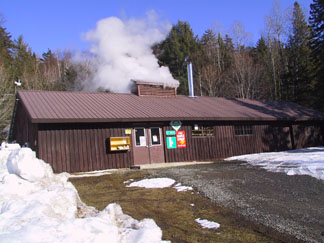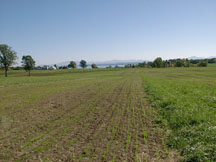Northern NY Agricultural Development Program 2008-09 Project Report
Project Leader(s):
Brian Chabot, Professor, Cornell University, Little Rice Hall, Ithaca, NY 14850,bfc1@cornell.edu, 607-254-4234
Michael Farrell, Northern NY Maple Specialist and Director of Uihlein Forest, 157 Bear Cub Lane, Lake Placid, NY 12946, mlf36@cornell.edu, 518-523-9337
Collaborator(s):
Cornell Cooperative Extension educators: Amy Ivy (Clinton), Emily Selleck (Essex), Richard Gast (Franklin), Michele Ledoux (Lewis/Jefferson), Steve Vandermark (St.Lawrence)
Cooperating Producers:
Many producers attended the workshops and engaged with landowners in order to gain access to additional trees for tapping. A partial list of these producers include Tony Corwin (Essex), Carol Gonyea (Essex), Jamie Rogers (Essex), Brad and Michael French (Essex), Michael Parker (Clinton), Evan Zehr (Lewis), Haskell Yancey (Lewis), Mark Burnham (Jefferson), Jim Mueller (Franklin), Joseph and Paul Schork (Franklin), Roger Hastings (Franklin).
Background:
Maple syrup production is an important cultural and economic activity in NNY, both in terms of direct sales and as a stimulus to tourism. The demand for maple syrup is rapidly outpacing supply and prices are at record high levels. The bulk price for all grades of syrup is approximately 50% higher than just a few years ago.
Maple producers are anxious to expand their production in order to fill the growing markets. However, the majority of large maple producers have already tapped all of the trees they own. Therefore, the primary ways to add taps are through purchasing more land, leasing trees from neighbors, or purchasing sap collected by a neighbor.
Leasing and cooperative business arrangements are often the most practical and economical solution. Existing maple producers already have made the capital investment in facilities and equipment needed to produce high-quality syrup in a cost-effective manner. The variable costs of boiling additional sap are only a small fraction of the cost of the syrup produced. The fixed costs for starting a full operation require significant initial investment, which may make sense in some cases.
There is a vast resource of untapped trees in NNY as well as a wide variation in the utilization rates amongst the different counties (see table). Currently valued at $3.25 million, the value could grow to over $9 million annually if we were to increase the utilization rate for all of NNY to that of Vermont (2%). Note that these are also conservative figures based on the bulk price of $3/lb. If we were to account for the additional value of selling syrup in retail containers, producing value-added maple confections, and the associated revenues generated through agri-tourism events such as Maple Weekend, the economic impact would be much greater.
| Table 1. Current Production Figures and Potential Growth Based on Increasing the Utilization Rate to 2% for all NNY Counties (based on current average prices of $3/lb) | |||||||
|
|
Number of |
Actual Taps |
Utilization |
Current Annual |
Possible Annual |
||
|
County |
Potential Taps |
(2000 Census) |
Rate |
Revenue |
Revenue |
||
|
Clinton |
5,146,949 |
91,618 |
1.78% |
$687,135 |
$772,042 |
||
|
Essex |
10,164,673 |
20,677 |
0.20% |
$155,078 |
$1,524,701 |
||
|
Franklin |
14,255,577 |
24,352 |
0.17% |
$182,640 |
$2,138,337 |
||
|
Jefferson |
3,862,308 |
12,528 |
0.32% |
$93,960 |
$515,618 |
||
|
Lewis |
12,215,797 |
186,977 |
1.53% |
$1,402,328 |
$1,630,809 |
||
|
St. Lawrence |
21,022,781 |
97,356 |
0.46% |
$730,170 |
$2,806,541 |
||
|
Total |
$3,251,310 |
$9,388,048 |
|||||
Clinton and Lewis counties already have a very strong maple heritage similar to that of Vermont. At 1.78% and 1.53%, respectively, their utilization rates are much higher than the other NNY counties and almost as high as the 2% rate achieved in Vermont.
Our goal is to enhance the maple producing capacity of all of NNY counties in order to achieve the full economic development potential from our forests while maintaining the highest standards of environmental quality.
Outside the Forest Preserve lands, the vast majority of potential taps occur on privately owned forestland. Yet many forest owners, including NNY farmers, are unaware of the possibilities that exist for utilizing their maple trees.
Maple syrup production is especially important during these tough economic times, as the stumpage price for maple sawlogs has fallen along with the housing market. Whereas using the forests for timber was once more profitable, landowners must now seek alternative sources of income as demand for wood products diminishes.
Now that the exchange rate with Canada has equalized, there is no longer an economic advantage for US companies to purchase Canadian syrup, which opens a large market for NNY maple producers to fill.
Finally, utilizing the forest for maple production through direct tapping or leasing to an existing producer may also qualify a landowner to receive agricultural assessment on that forestland, thereby significantly reducing their property tax burden.
Educating landowners about these qualities and encouraging greater collaboration with existing producers is essential to expanding the NNY maple industry.
Methods:
In September 2009 we surveyed 374 maple producers to acquire information on their desire to increase production via leasing additional trees or boiling additional sap that was brought to them by someone else.
We also developed a brochure explaining the options to landowners for getting involved with maple production and announcing a series of seven workshops spread out over NNY in the month of October.
We worked with NNYADP Publicist Kara Lynn Dunn to develop several press releases and articles promoting the workshops. Michael Farrell then traveled to each of the six counties in October to deliver a presentation to landowners and maple producers. We collected survey responses from landowners and then analyzed them in November.
Results:
Overall the project was successful at educating landowners about the opportunities for getting involved with the maple industry, determining the perceived opportunities and barriers for landowners to getting involved, and developing a mechanism for connecting landowners who want to lease their forestland or sell sap with maple producers that want to expand. This section will discuss these three different aspects in detail.
Landowner Outreach
Approximately 7,000 landowners in NNY received a brochure entitled “Getting Involved with Maple Syrup Production: Options for Landowners in NY”.
There were also several press releases related to this project which generated at least 82 media hits through newspaper, magazines, radio, TV and websites. Michael Farrell received roughly 20 calls from landowners asking about the programs and how to get involved with maple production.
As a testament to the importance of media coverage, the head forester for Rayonier happened to see an article in the newspaper about the project. Rayonier is a large landowner in the ADKs with tens of thousands of acres. Several of the company’s top executives visited the Uihlein Forest during a business meeting in September and have since decided to lease some of their lands to maple producers in Lewis and St. Lawrence counties.
Landowner Surveys
At all of the workshops we asked the landowners who were not currently producing syrup to fill out a survey. We received 34 useable survey responses from landowners that generated interesting and useful results.
Landowners were asked what the primary obstacles to their involvement in maple production has been so far. The top response (55%) was that ‘the initial cost of buying equipment was too high’. Other significant responses included ‘I have never had enough time’ (35%), ‘I did not think I had enough tappable maple trees’ (35%), ‘I never thought about it as an option’ (32%), and ‘I wasn’t aware of agricultural assessment for maple production’ (29%).
Also asked was the primary reason(s) the landowners were considering using their maples for syrup production. As a sign of the times of a depressed economy, the top result was ‘I am looking for supplemental income’ (52%). The next highest responses included ‘I would like to obtain an agricultural assessment for my land’ (35%) and ‘I have a better idea on how to get started’ (32%).
Landowners identified how likely they are to produce maple syrup themselves, lease their forestland to a maple producer, or collect sap and have it boiled at a nearby sugarhouse. The responses indicated that landowners were generally interested more in direct involvement than leasing their maple trees.
54% of landowners indicated that they would be likely or very likely to produce syrup themselves after attending the workshop. For comparison purposes, only 29% of landowners indicated that they would be likely or very likely to collect sap to be boiled at a nearby sugarhouse whereas 22% would lease their forestland to another producer.
Landowner/Maple Producer Connections
From the letter and survey sent out to 374 maple producers in NNY we only received responses from 32 producers that were interested in expanding by leasing trees or buying in sap. This was disappointing, so we are advertising and explaining the project in greater detail during the winter maple schools this January. We will be handing out surveys to more producers at these meetings in order to gain a more comprehensive list of those that are interested in expansion.
Conclusions/Outcomes/Impacts:
Michael Farrell reported hearing several stories of landowners deciding to lease out their forestland to maple producers as a result of the outreach efforts, including Rayonier (a very large landowner) and several smaller landowners in Clinton and Essex counties. A lot of the work that was done this past year was planting the seeds for future development and growth. We learned that many landowners are not aware of the details regarding agricultural assessment for maple production; we also learned that they are very interested in using their maples for syrup production when they do find out about the tax benefits.
All of the survey data also indicate that landowners and producers working together will allow NNY to overcome the perceived hurdles to increasing production. For instance, the number one obstacle for getting started was that the initial cost of buying equipment is too high. However, one could just buy the necessary equipment to collect the sap and then have it boiled at a nearby sugarhouse where a producer has already made all of the investments in the building, evaporator, reverse osmosis, and other equipment necessary for producing syrup.
Outreach:
Michael Farrell has presented results of this project at the NYS Maple Conference in Verona, NY and is scheduled to present the results at the NNY Maple Schools taking place on January 23 (Lewis County), January 29 (Clinton County) and January 30 (St. Lawrence County). Brian Chabot will present this information at the maple school in Warren County on February 6.
For More Information:
Michael Farrell
Cornell University Department of Natural Resources
Uihlein Maple Forest
157 Bear Cub Lane
Lake Placid, NY 12946
mlf36@cornell.edu
http://maple.dnr.cornell.edu
(518) 523 9337; cell: (518) 637 7000

